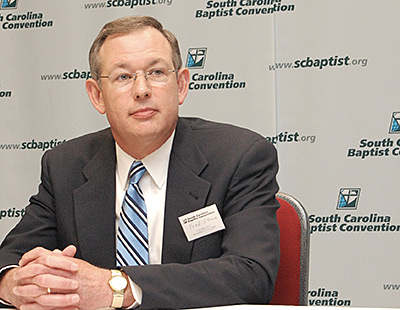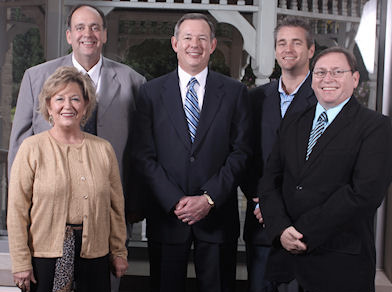Fred Stone, pastor of Pickens First Baptist Church, has been elected president of the South Carolina Baptist Convention.
 Traditional Southern Baptist denominationalism “is not working anymore,” newly chosen SCBC president Fred Stone told reporters after his election Nov. 11.
Traditional Southern Baptist denominationalism “is not working anymore,” newly chosen SCBC president Fred Stone told reporters after his election Nov. 11.SCBC messengers, meeting Nov. 11 in Columbia, chose Stone, 53, over Abbeville pastor Kile Antone, 36. Stone received 58.6 percent of the total 431 votes cast.
Ralph Carter Jr., pastor of Brushy Creek Baptist Church, Taylors, placed Stone’s name in nomination. He called Stone a humble and gifted leader who “never waffles in his conviction.”
Stone has served as a pastor in South Carolina for 27 years. He previously served at Cornerstone Baptist, Clinton; Utica Baptist, Seneca; and First Baptist, Mayo.
He is a graduate of Clemson University (B.A.), Southwestern Seminary (M.Div.) and Reformed Theological Seminary (D.Min.).
He is a former SCBC first vice president (2007) and served as SCBC parliamentarian for the 2009 annual meeting. He served on the Southern Baptist Convention Committee on Committees in 2006 and tellers committee in 2005.
He and his wife Lisa have two grown sons and one grandson.
While acknowledging in an Oct. 20 Baptist Courier article that the SCBC is among the healthiest state conventions, Stone also said “change is happening” in South Carolina.
“Denominations are declining,” he said. “We can’t keep on doing what we’ve always done. It’s time for us to carefully evaluate what we are doing, find out what is working and what is not, and then make whatever changes are necessary to make our convention more effective in serving churches.
 SCBC officers for 2010, from left: recording secretary Linda Hite, Redbank Baptist Church, Lexington; registration secretary Quinn Hooks, Evergreen Baptist Church, Effingham; president Fred Stone; second vice president Brad Atkins, First Baptist Church, Powdersville; and first vice president Dusty Bradshaw, Hillcrest Baptist Church, North Charleston.
SCBC officers for 2010, from left: recording secretary Linda Hite, Redbank Baptist Church, Lexington; registration secretary Quinn Hooks, Evergreen Baptist Church, Effingham; president Fred Stone; second vice president Brad Atkins, First Baptist Church, Powdersville; and first vice president Dusty Bradshaw, Hillcrest Baptist Church, North Charleston.“I will encourage South Carolina Baptists to make whatever methodological changes need to be made, but emphasize that our theological convictions must never change: our biblical doctrines summarized in the Baptist Faith & Message 2000, our commitment to fulfilling the Great Commission, and our ultimate purpose of glorifying God in everything we do.
“If we will remain biblically sound as we seek to be more culturally relevant and practically effective, I believe the SCBC will continue to be a leader among state conventions in the SBC.”
Stone, whose church gives approximately 14 percent of undesignated offerings to the Cooperative Program, said he supports a “united effort” to fund convention work by encouraging churches to “give generously” through the Cooperative Program.
In the face of declining denominational involvement, Stone said “we must demonstrate reasons why individuals and churches should be involved in a denomination, as opposed to their doing ministry and missions on their own.”
“I think there are still good reasons for churches and individuals to support the SCBC and SBC,” he said, “but we must do a better job of explaining and providing answers. Our churches can accomplish so much more together than we can alone.”